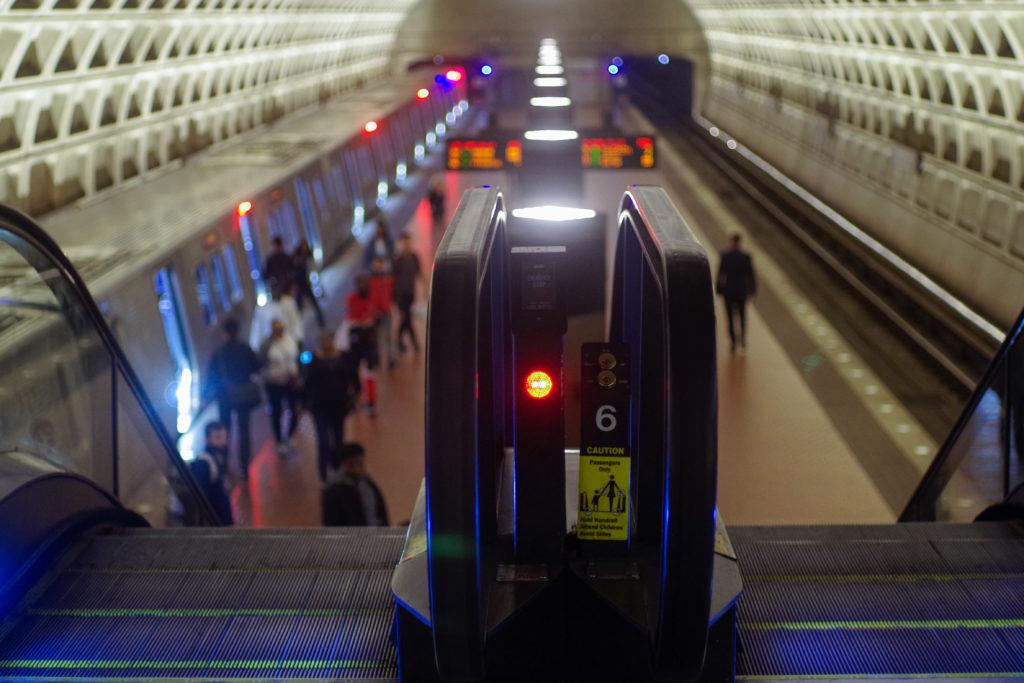Updated: March 12, 2020 at 9:32 a.m.
Proposed D.C. Council legislation that would credit District residents $100 a month to use public transportation would boost Metro ridership, local leaders said.
The legislation, which Ward 6 Councilmember Charles Allen proposed last week, aims to support the D.C. economy and incentivize people to use public transportation as an alternative to high parking costs and traffic congestion. Foggy Bottom and West End Advisory Neighborhood Commissioners said the plan will incentivize more people to use public transportation, but they added that the city’s plan to fund the program through budget surpluses is not the most sustainable plan.
ANC Chairman Patrick Kennedy said Allen’s proposal will likely result in “no loss” to WMATA’s revenues because the plan will encourage new riders to view public transportation as a viable option for commutes.
“There are all sorts of financial decisions that people make their transportation choices based off of,” Kennedy said. “In this case, it’s just tipping the scales in favor of people making the choice that values public transportation.”
The proposal’s estimated annual costs run between $54 and $151 million and would be funded by extra tax revenue created through the District’s annual spending, The Washington Post reported last week.
Allen did not return requests for comment.
Kennedy said budget surpluses are not a “durable source of funding” for the program because the District’s economic expansion and rapid population growth could stall “at any time.”
“The conditions that we’re experiencing now are unprecedented and unlikely to continue,” he said. “That being the case, we can’t make spending commitments today unless we have a source of revenue that we can raise that is going to be with them into the future.”
Kennedy added that congestion charges, which require fees for drivers in busier business districts during rush hours, are another potential source of revenue. London officials have implemented a one-time daily congestion charge for driving in specific zones, using cameras to detect which drivers are on the road.
New York City became the first U.S. city to approve congestion charges in April, but the process of implementing the fees may be stalled as the city waits for federal buy-in.
Senior and ANC Vice Chair James Harnett said a congestion charge would make “the most sense” to subsidize the proposal because it would incentivize people to use public transit instead of cars while maintaining transit operation funding. He added that surplus tax revenue in D.C. should be invested into other priorities, like affordable housing and childcare.
“That’s the leading choice for D.C. legislators at this point, and I think that it’s the one that is the most sustainable and makes the most sense moving forward, in that it directly ties into and disincentivizes driving into the city, which is something we need to be doing and we should have been doing years ago,” Harnett said.
He said local and federal politicians have traditionally focused on providing resources like affordable housing and creating jobs, but access to transit is “transformational” in allowing people to access already existing resources.
Metro created a mobile payment system and offered riders refunds for delayed trips during rush hours.
“Our city for a really long time has not recognized the potential of providing transit subsidies and free transit for all,” Harnett said. “I’m really excited to see this become a part of a larger discussion around how to mend our social injustices and recognize there’s more that we can and should be doing to protect the livelihoods of all of our city’s revenue.”
ANC commissioner Detrick Campbell said the proposal is an “excellent piece of legislation,” but the Council should focus more on working with the Washington Metropolitan Area Transit Authority to improve the accessibility and reliability of D.C.’s rail and bus systems.
Students have long criticized public transportation costs and advocated for late-night hours and opt-in discounted passes.
Campbell said Allen’s proposed plan may increase ridership, but would still exclude residents who do not use public transit because Metro stops are too far from their homes.
He added that Allen should focus on expanding the District’s public transportation services to make car ownership in D.C. “completely optional.”
“Without the reliable and accessible pieces coming first, I do not believe the legislation will have its intended effect of equitable transportation in the city or moving people who cannot be multimodal,” Campbell said in an email.
This post has been updated to reflect the following correction:
The Hatchet incorrectly quoted ANC Vice Chair James Harnett. His quote is now correct. We regret this error.



